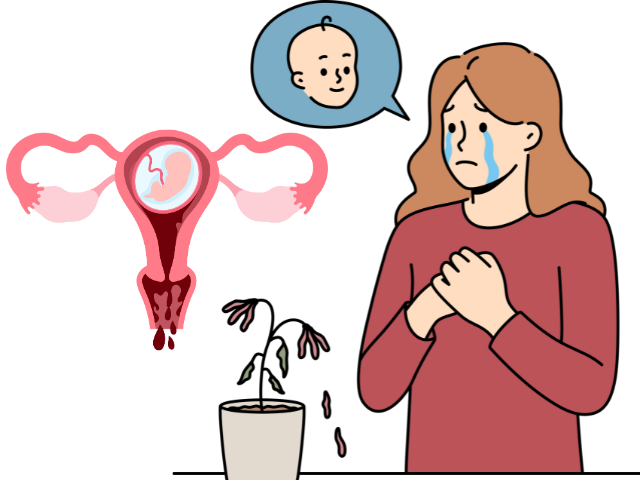If you have suffered a miscarriage and need medical treatment to prepare for a future pregnancy, consult our experienced gynecologists at KK Virat Hospital, Karimnagar. We provide safe, confidential, and effective treatment to ensure complete recovery.
About Miscarriage Treatment
A miscarriage, also known as a spontaneous abortion, is the loss of a fetus before 20 weeks of pregnancy. It commonly occurs during the first trimester.

Miscarriage Statistics:
- An incomplete miscarriage can lead to severe infections, consecutive miscarriages, permanent infertility, and life-threatening complications.
- Around 10-15% of pregnancies result in miscarriage.
- NIH reports a miscarriage prevalence of 32% among Indian women.
Types of Miscarriage
- Threatened Miscarriage – Possible risk of miscarriage, but pregnancy may continue.
- Inevitable Miscarriage – Miscarriage cannot be prevented.
- Complete Miscarriage – All pregnancy tissues have been expelled.
- Incomplete Miscarriage – Some pregnancy tissues remain in the uterus.
- Missed Miscarriage – The fetus has stopped developing but has not been expelled.
- Recurrent Miscarriage – Multiple consecutive pregnancy losses.
Miscarriage – Diagnosis and Treatment
Diagnosis of Miscarriage
Before proceeding with treatment, our gynecologists conduct diagnostic tests to confirm miscarriage, such as:
- Ultrasound – Checks fetal heartbeat and development.
- Pelvic Examination – Determines cervical dilation.
- Blood Tests – Assesses pregnancy hormone levels.
- Chromosome Test – Identifies genetic causes of recurrent miscarriages.
- Tissue Test – Examines expelled tissue to confirm miscarriage.
Treatment for Miscarriage
Once pregnancy loss is confirmed, the doctor may recommend a Dilation & Curettage (D&C) procedure to remove remaining pregnancy tissues safely.
D&C Procedure:
- A curette (spoon-shaped instrument) is used to gently scrape the uterine lining.
- Performed under general anesthesia.
- The gynecologist dilates the cervix and removes fetal tissues from the uterus.
Why Choose KK Virat Hospital for Miscarriage Treatment?
- 100% Confidential and Safe Treatment – Complete privacy assured.
- Experienced Female Gynecologists – Over 10+ years of expertise.
- Independent Decision for Women Above 18 Years – No parental or spouse consent required.
Book Your Appointment Today
For expert Miscarriage Treatment in Karimnagar, visit KK Virat Hospital. Book a consultation today for personalized treatment options!
- Call Us Directly: Contact our medical coordinators to schedule an appointment with an expert Gynecologist.
- Direct Visit: If you have a medical history, you can visit our hospital directly by carrying your previous medical records. However, admission will be based on the doctor’s recommendation.
What are the risk factors of miscarriage?
Several factors can increase the risk of miscarriage, including advanced maternal age, hormonal imbalances, chronic medical conditions (such as diabetes and thyroid disorders), uterine abnormalities, infections, lifestyle factors (smoking, alcohol consumption, obesity), and genetic issues.
What is a recurrent miscarriage?
Recurrent miscarriage is when a woman experiences two or more consecutive pregnancy losses before 20 weeks of gestation. It may indicate underlying medical conditions or genetic factors that require further evaluation.
What is the treatment for recurrent miscarriage?
Treatment for recurrent miscarriage depends on the cause. It may include hormone therapy (such as progesterone supplements), treating underlying medical conditions, lifestyle modifications, or surgical interventions like cervical cerclage for cervical insufficiency.
What is a missed miscarriage?
A missed miscarriage occurs when the fetus has stopped developing, but the body has not yet expelled it. It is usually diagnosed through an ultrasound and may require medical intervention, such as medication or a D&C procedure, to remove pregnancy tissues.
What are the benefits of D&C treatment after miscarriage?
A Dilation and Curettage (D&C) procedure helps remove remaining pregnancy tissues, preventing infections and complications. It ensures a complete recovery, reduces the risk of future fertility issues, and helps regulate menstrual cycles.
How is miscarriage diagnosed?
Miscarriage is diagnosed through ultrasound, pelvic examination, blood tests (to check hormone levels), chromosome tests (for recurrent miscarriage), and tissue analysis if the pregnancy tissue has passed.
How long does it take to recover from a miscarriage?
Physical recovery from a miscarriage usually takes a few weeks, while emotional recovery may take longer. Most women resume normal activities within a few days, but it is advised to wait at least one menstrual cycle before attempting to conceive again.
Can stress cause a miscarriage?
While extreme stress can affect overall health, mild to moderate stress is not a direct cause of miscarriage. However, chronic high-stress levels may contribute to hormonal imbalances that can impact pregnancy.
When should I see a doctor after a miscarriage?
You should see a doctor immediately if you experience excessive bleeding, severe abdominal pain, fever, foul-smelling discharge, or signs of infection after a miscarriage. A follow-up visit is also essential to ensure complete recovery.
Can I get pregnant again after a miscarriage?
Yes, most women can conceive again after a miscarriage. Doctors generally recommend waiting for at least one menstrual cycle before trying again to allow the body to heal and prepare for a healthy pregnancy.



